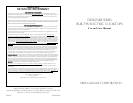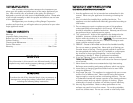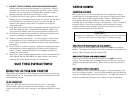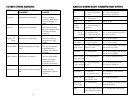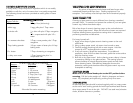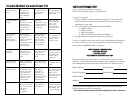
5
SSuurrffaaccee CCooookkiinngg
CCooookkiinngg UUtteennssiillss
Each cook has his or her own preference for the particular cooking
utensils that are most appropriate for the type of cooking being done.
Only certain types of glass, glass/ceramic, ceramic, earthenware, or
other glazed utensils are suitable for glass cooktop use without
breaking due to the sudden change in temperature. This is a matter of
personal choice. As with any cookware, yours should be in good
condition and free from excessive dents on the bottom to provide
maximum performance and convenience.
OOppeerraattiinngg tthhee SSiinnggllee FFrroonntt oorr RReeaarr EElleemmeenntt
Push in and turn the corresponding control knob left to the desired
setting. The element will cycle on and off to maintain the desired heat
setting. When finished, turn all controls OFF.
OOppeerraattiinngg tthhee RReeaarr aanndd BBrriiddggee EElleemmeenntt
Push in and turn the corresponding control knob right to desired
setting. The rear element and bridge element will cycle on and off to
maintain the desired heat setting. When finished, turn all controls to
OFF.
HHoott SSuurrffaaccee IInnddiiccaattoorr LLiigghhttss
The cooktop has hot surface indicator lights. They are located on the
front of the glass cooktop. The hot surface indicator light will glow red
when the corresponding element is turned on. The light will remain on
until the corresponding element has cooled to a safe temperature.
CCAAUUTTIIOONN
Using cast iron cookware on the glass cooktop is not recommended.
Cast iron retains heat and may result in cooktop damage.
4
11. DO NOT TOUCH SURFACE UNITS OR AREAS NEAR UNITS
..
Surface areas may become hot enough to cause burns. Surface
elements may be hot even though they are dark in color. During
and after use, do not touch or let flammable materials contact
heating elements until they have had time to cool.
12. To reduce the risk of burns, ignition of flammable materials, and
spillage due to unintentional contact with the utensil, the handle of
a utensil should be positioned so that it is turned toward the
center of the range so that it does not extend over adjacent
surface elements.
13. Keep area clean and free from combustible material, gasoline, and
other flammable liquids. Combustible items (paper, plastic, etc.)
may ignite and metallic items may become hot and cause burns.
14. Do not heat unopened food containers; build-up of pressure may
cause the container to explode and result in injury.
15. Clean the cooktop with caution. If a wet sponge or cloth is used
to wipe spills on a hot cooking area, be careful to avoid steam
burns. Some cleansers can produce noxious fumes if applied to a
hot surface.
16. Do not cook on a broken cooktop. Spillovers or cleaning solution
may penetrate a broken glass top and create a risk of electrical
shock. Contact a qualified technician immediately should your
cooktop become broken.
17. Only certain types of glass, glass/ceramic, ceramic, earthenware or
other glazed utensils are suitable for glass cooktop use without
breaking due to the sudden change in temperature.
--SSAAVVEE TTHHEESSEE IINNSSTTRRUUCCTTIIOONNSS--
BBeeffoorree YYoouu UUssee YYoouurr NNeeww CCooookkttoopp
All products are wiped clean with solvents at the factory to remove any
visible signs of dirt, oil, and grease which may have remained from the
manufacturing process
GGllaassss CCooookkttoopp
Clean your glass top before the first time you use it. A thorough
cleaning with a glass top cleaner is recommended. It only takes a
minute and puts a clean, shiny coating on the glass top before its initial
use.



